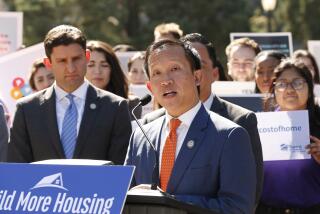Suit Seeks to Stop Church Sanctuary Prosecutions
- Share via
SAN FRANCISCO — A coalition of religious groups sued the Reagan Administration on Tuesday, seeking to block federal prosecution of church sanctuary workers and to bar deportations of refugees to El Salvador and Guatemala.
The suit, filed by the Center for Constitutional Rights and the National Lawyers Guild on behalf of 80 religious organizations, requests a court order granting “temporary refuge” to “persons fleeing war, persecution and widespread human rights violations in Guatemala and El Salvador.”
The suit also says prosecution of those offering sanctuary to refugees violates the right to free exercise of religion.
“The religious sanctuaries are performing the obligations of persons of faith to stand with the persecuted and the stranger in their midst, in accordance with Scripture,” the suit said.
The plaintiffs include the national organizations of the Presbyterian Church, the Unitarian-Universalist Assn., the United Methodist Church and the American Baptist Churches in the U.S.A., all of which have endorsed the sanctuary movement.
Three members of the sanctuary movement have been convicted of alien smuggling or related charges in Texas, and 16 have been indicted in Arizona.
Ban on Deportations Sought
The suit seeks an order dismissing those charges and barring new prosecutions of “persons affiliated with the religious movement of sanctuary” who are aiding Salvadoran and Guatemalan refugees.
It also seeks an order forbidding deportations to El Salvador and Guatemala “until such time as war, persecution and the commission of human rights violations in those countries have ceased.”
The Reagan Administration contends that most refugees from El Salvador and Guatemala are fleeing for economic reasons and not from political persecution and thus are not entitled to asylum.
Morton Stavis, president of the Center for Constitutional Rights, said at a news conference that the Administration’s policy on deportation violates the 1980 Refugee Act, which allows refuge to those with a “well-founded fear of persecution” in their homelands.
More to Read
Sign up for Essential California
The most important California stories and recommendations in your inbox every morning.
You may occasionally receive promotional content from the Los Angeles Times.










